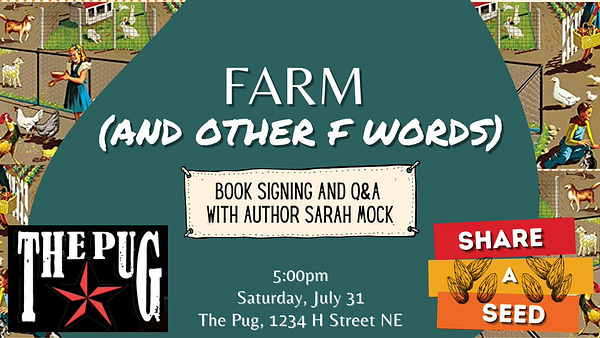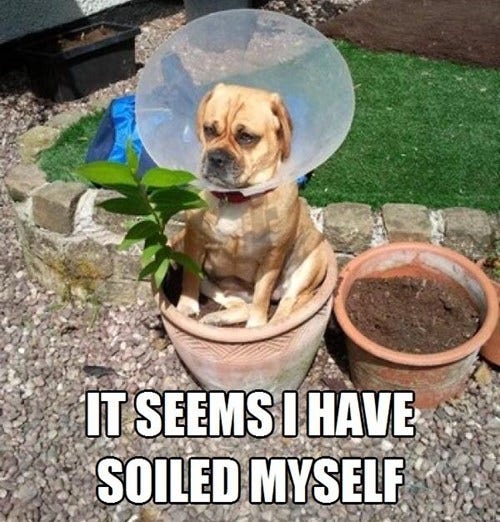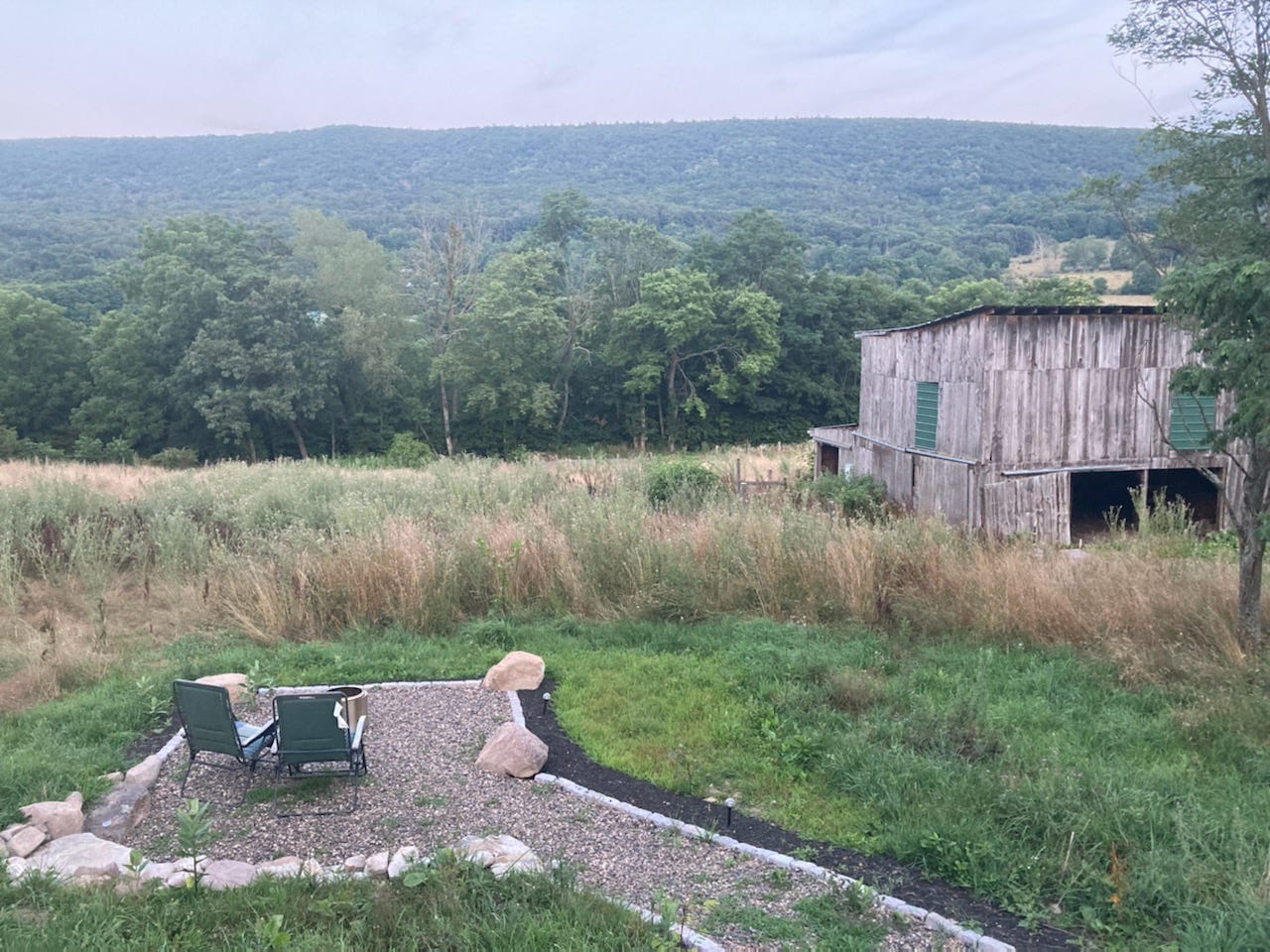Hello Big Team—
I’m midway through my transition from working/wrapping up loose ends on Farm (and Other F Words) to getting deep in the weeds of book two. And also living my life and stuff. I’ve been trying to get back into writing the kind of essays in this newsletter that I get really jazzed about, the kind that I sit down to work on for like half an hour and when I look up five have gone by. This one comes to mind. Or this one.
But for whatever reason, it’s just not happening. I don’t really subscribe to the idea of writers block (I’ve never really been *unable* to write, this email being a case in point), and the thing is, what I’m feeling is 100% not linked directly to writing at all. It’s linked to any and all kinds of work, even some work that I pretend is leisure. I just don’t want to do it. Any of it. And this is not a passing “meh.” This is a “my bones are made of lead and my essence has committed to doing nothing, regardless of the consequences.”
The good news is, it doesn’t seem like it’s just me. In an effort to combat these feelings (that honestly have been persistent for weeks if not months at this point) I’ve scheduled a lot of calls and lunches with friends and colleagues this week. And it sounds like *a lot* of people besides me are looking around at their late-pandemic life thinking:
Here’s my thing. I started freelancing in October 2019. That was a big reset, and in a lot of ways, it required a pretty complete deconstruction of the very idea of a career path. Then I was building my own career from the ground up, one story, one contract, one gig at a time. It took me about six months, till say, oh, March 11, 2019, to really feel like I was starting to get some height on my Jenga tower of a freelance career. And then, boom. The pandemic knocked it down. It was okay though. We were all in it together. We were all starting from square one. We had this new challenge, and all this extra time to spend focusing on work now that all that pesky and unproductive human interaction was out of the way. So I threw myself into writing the book, learning about and working on equity and justice where I could, and having anywhere from four to nine active freelance gigs/contracts at a given time. I picked up those scattered Jenga logs and I reassembled them as aggressively as I could, even higher, I’d guess, than they were before.
And now it’s now. The book is out. Many of the contracts and extra projects have wrapped up or wound down or imploded, and the pandemic is shifting yet again. Some of the tower collapsed accidentally, some of it intentionally. And here I am, for the third time in three years, laying down the first layer of logs for yet another version.
Maybe it’s a little childish to feel like chucking all the work across the room and yelling, “I don’t want to start over!” Maybe it’s a little short-sighted and nihilistic to feel like I somehow got stuck in a year long version of Groundhogs Day, doomed to relive the first year at a new job over and over again. Maybe all the “hardships” of “getting back to normal” are not really hardships at all, and I’m really just making mountains out of molehills.
But a wise Burkinabe priest once told me that “All emotions are true,” and I’m not in a place where I can functionally criticize my feelings for not being more mature or farseeing or tough, or put them aside to be dealt with at a later date.
So here’s what I feel. I feel more than a years worth of overwork and under-socialization. I feel trapped between the absolute hatred of my pandemic apartment and the dread I feel every time I have to leave it. I feel joy at the idea of seeing people I’ve missed for months, blended with the anxiety that I don’t know how to relate to them (or anyone) anymore and grief for the time lost. I feel lonely, because so many people have moved on, moved away, and changed so much of their lives, and I feel the pang of regret wondering if I should have done the same. But somehow, overtop all of these emotions, like the smooth layer of sour cream on the tippity-top of an emotionally-dense seven layer dip, there is just apathy. An apathy that snuffs out my will to take any action that might address the above feelings. An apathy that sets an alarm for 7am every morning and lets it go off every 8 minutes until 8:45. An apathy that quietly allows me to move items to tomorrows to-do list until completing them becomes entirely irrelevant and I just don’t have to do them anymore. Lacking the mischievousness of ¯\_(ツ)_/¯ this apathy comes off more like ¯\_(*_*)_/¯.
So that’s where I’m at. I’m looking at my collapsed late-pandemic Jenga tower of a life, desperate to feel the energy to start putting it back together again, but instead, I feel like… fuck Jenga. And fuck the 40 hour work week (and the 50, 60, 70, and 80 versions too). Fuck work-life balance, career paths, and professional success. Fuck writing, and fuck this newsletter. Fuck money, fuck rent, and fuck the fact that I have to pay it in advance when employers don’t have to pay me until *after* the work is done (often looooong after). Fuck inflation. Fuck grocery shopping. Fuck farming and every last bit of agriculture on Earth and throughout the universe. Fuck laundry. Fuck capitalism. Fuck urbanization. Fuck Congress and the Biden Administration. Fuck non-profits. Fuck Washington, D.C. and Wyoming. Fuck social media in general but Instagram in particular. Fuck all billionaires. Fuck the state of journalism. Fuck art. Fuck fossil fuels. Fuck self-care. Fuck climate change. Fuck any piece of technology that begins with an i, what a fucking trite symbol of consuming self-obsession. Fuck coffee and alcohol and drugs and music festivals and video games and beach reads and Netflix and all the other things that we use to get through this whole fucking piece of shit situation without falling the fuck apart. Fuck being put together. Fuck progress. Fuck maturity. Fuck being your own boss and making your own decisions and fuck the fantasy of independence and the nightmare of individualism most of all.
Oh yeah. And fuck the pandemic.
On the Off Chance You Came Here to Read about Farming
The most lovable but also heartbreaking feedback I continuously get from people who read this newsletter (kind of?) but aren’t actually super *here* for the farming talk is “I open it and just scroll straight to the bottom to see what you’re watching this week.” At the same time, its both a schwew moment for me— because then I can convince myself that no one’s paying attention to my occasional less-than-stellar newsletter, but it’s also painful to think hahahaha why do I spend 5+ hours a week on a newsletter when I could just write one paragraph about the TV I watch and be done with it! Anyway, I’ve decided to lean into the agricultural abyss.
Since I’m already worked up, let’s talk briefly about this Bloomberg article about how Regenerative is the New Organic. This will not be a thorough examination, just the flippant and piecemeal hottakes that occurred to me mid-read.
Though I appreciate this articles *very* brief nod to regen ag’s origins— amongst Indigenous people, of course— a few other quotes brought me up short.
“The process [of regenerative ag] is expensive, since farmers who embrace it must limit or forego cash crops.”
What the actual fuck is happening is in this quote. Does Larissa just not know what a cash crop is? The article has several different examples, not only of people growing regenerative crops to sell in the marketplace (making them by definition, cash crops), but even of large-scale farmers growing essentially commodity grains and earning a premium! Expense is always relative. Imagine if this sentence said, “The process of making jumbo jets is expensive, since Boeing must limit or forego the building of Sesnas and crop dusters.” In a sentence, it underlines the essential assumption that natural state of American agriculture is growing food badly and cheaply, and that to ask farmers to do otherwise is ask them to do something that, since they don’t want to do it, must be the wrong thing to do. Regeneratively grown crops are cash crops. And no one is entitled to easy work.
Scott Park, 71, has been farming for more than 35 years. His business, Park Organics, was certified by the California Certified Organic Farmers back in the 1990s. Since 2007, he’s employed regenerative techniques on 1,350 acres of land located in the state’s Central Valley.
I’m just here to point out that Park owns, by my rough estimations, at least $17.6 million worth of farmland in California.
“Consumers want perfection, but farmers want commodity,” he said.
This is kind of a laughable sentence. How the fuck would consumers know what perfection is? It doesn’t matter how much I care about regenerative ag, when I’m buying tomato sauce at the grocery store and there’s 700 varieties, all I have to go by is what’s on the label. And no one is regulating regenerative labeling, so it’s all bullshit. On the other hand, “farmers want commodity” is a very kind way of saying “farmers want to grow whatever they want, however is easiest/cheapest, and they want someone to buy it no matter what.” If I could wordsmith a quote, I’d go with, “Consumers want safe, healthy, delicious food that doesn’t jeopardize the planet in the way that it’s grown, but farmers want them to want whatever they grow.”
For Park, growing sunflowers made crop rotation more profitable, since the plants are both different from his normal crops and leave a lot of biomass.
A lovely tidbit for the “pay farmers to do regenerative” crowd. Diverse, management-intensive, regenerative farming is *more profitable* y’all. No payment required.
It [General Mills] has pledged to support regenerative agriculture on 1 million acres by 2030—though Professor Sumner notes that’s only 0.11% of U.S. farmland.
Bless Larissa for her inclusion of this reality check. If every major food brand in the US tackled 0.1% of farmland transition we’d be up to… like 0.5% of farmland transitioned by 2030. That’s right— consolidation is a fucking problem in the grocery store. Last one:
But still, when it comes to branding, Griffith finds herself running into the problem Bartelme warned of: explaining to consumers why they should buy her products.
“How do we educate that this is better for the soil, which equals better food for you?” Griffith said.
Let me tell a quick story. A few months ago, I was at an event that asked this question of participants iClicker style (fuck iClicker), “Why is regenerative agriculture important?” It was multiple choice with the following options (from memory):
A. Improve soil health
B. Increase crop quality and productivity
C. Mitigate climate change
D. Increase farm profitability
E. Improve food system resiliency
Let me tell you. LIKE 65% OF ATTENDEES SELECTED A. Y’all. A is the only wrong answer up here. Improved soil health *is not an end in itself.* Yes, healthy soil is good, sure, whatever. But no human, whether they’re malnourished from poor quality food or no food at all, can eat soil, no matter how healthy it is. We could have healthier soil, and still wipe out life on Earth with climate change. Maybe D is the Slytherin answer, but listen, if I’m a smart farm-business owner, no matter how ethical, climate conscious, and progressive I am, I’m eyeing profitability all day long. And if big swaths of the population starves because our food system lacks the respect for nature, biodiversity, human diversity, equity, and redundancy that good regen systems can embody, the health of the soil will be cold comfort as we bury our dead beneath it.
So to get back to this quote, better for the soil = better for you is a dumb story, that’s why no one hears it. Regenerative ag could be transformative because it acknowledges that we’ve got to think differently— about the way we farm, the way we do business, the way we treat one another, and the way we treat the planet. Why is that a hard message to communicate through marketing, especially in an overcrowded and overpriced national packaged foods space? Because that kind of marketing is one of the very things that needs to be rethought. Brute-force marketing, where you give up on having a conversation and building community with the people you want to feed, opting instead to brainwash them with stupid-proof messaging, is not how you communicate about doing things differently. “Talking the talk without walking the walk” is the hallmark of food marketing. Walk the walk first, maybe, and then you don’t have to tell a fiction when you tell your customers that you’re doing things differently.
And you know what, I’ll go so far as to say (since I’m already riled up), maybe nobody needs a fucking “granola meets birdseed” buckwheat snack brand. Who knows, maybe it’s delicious, or maybe it’s just a dumb thing that the vast majority of people don’t really want, no matter how regenerative it is.
All this to say. Fuck consumerism. Fuck marketing regenerative agriculture. And maybe just fuck soil health, for good measure.
Last F(ew) Thing
Need a laugh? And all the angst and memes in this email didn’t getcha? Have you ever wondered if maybe your craving for the relief and gratification of laughter is a sign of an emptiness deep inside you? Yeah, me neither:
Don’t forget about this event coming sooooon!


My “Invites” tray remains open if you’d like me to say a few words at your summer wedding, tractor pull, or rodeo, shoot me an email.
If you’re new to Big Team Farms and want some explanation for what the F you just read, check out The Intro Newsletter and more recent additions by visiting Big Team Farms online.
Do you have announcements that would be relevant to the 1,400 or so members of the Big Team? Feel free to shoot me messages about projects, resources, job posting, etc. And to everyone who’s done that already, or who has asked questions that I haven’t yet responded to, look out for those in the next couple of newsletters.
Okay so all this week I’ve been in a yurt in West Virginia with no cell service. So sorry if I’ve missed your call, I’ve mostly been watching this:
There has been WiFi, but I don’t have big TV updates. We’ve rewatched all of Season 2 of I Think You Should Leave and decided that it’s funnier than we gave it credit for. Also, I’ve recently gotten very into watching 20/20 when I workout and make dinner and stuff, so I’ve seen some interesting true crime stuff there. Otherwise just trying to catch up on some reading, which you’ll probs hear more about next week.
Don’t forget to share this email!
Stay safe out there friends. Don’t forget, if you have funny gifs, thoughts, comments, stories, questions, feedback, catchy song lyrics, good podcast recommendations, or anything else to tell me, I’m right on the other end of this email.
Rock on,
Sarah










